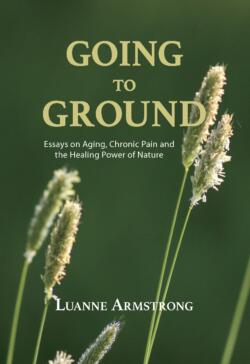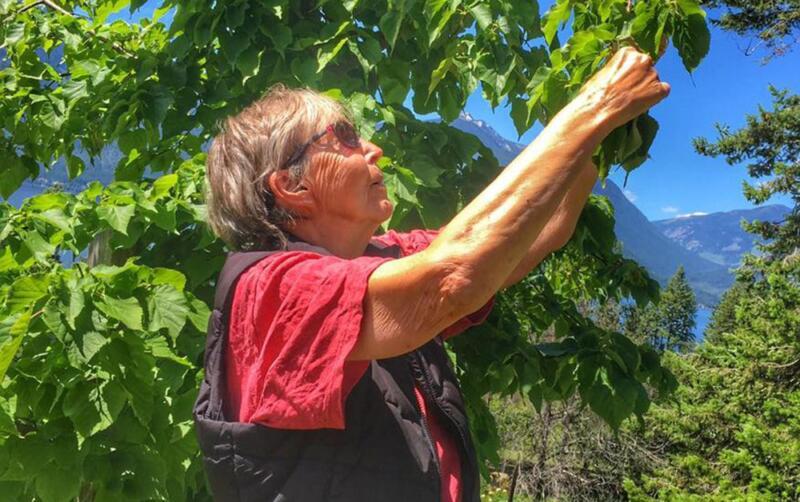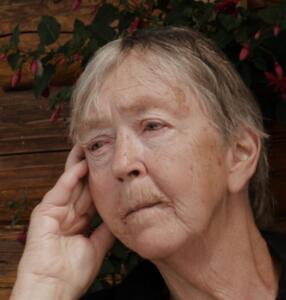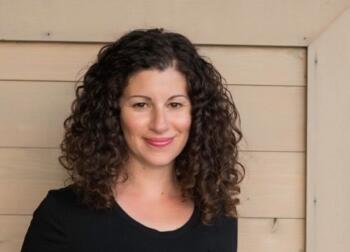1499 Not done yet
Going to Ground: Essays on Aging, Chronic Pain and the Healing Power of Nature
by Luanne Armstrong
Qualicum Beach: Caitlin Press, 2022
$24.95 / 9781773860756
Reviewed by Claire Sicherman
*
 I was really looking forward to reading Luanne Armstrong’s new book, Going to Ground: Essays on Aging, Chronic Pain and the Healing Power of Nature, mostly because i. I am aging (which I often wish to forget); ii. I have chronic pain (which I also wish to forget), and iii. I am a firm believer that nature is healing. Through powerful lyrical prose that will simultaneously make you laugh out loud and break your heart, Armstrong takes aging, chronic pain and nature and expertly weaves them together in this collection of essays, connecting them to the world in which we live, including our changing climate.
I was really looking forward to reading Luanne Armstrong’s new book, Going to Ground: Essays on Aging, Chronic Pain and the Healing Power of Nature, mostly because i. I am aging (which I often wish to forget); ii. I have chronic pain (which I also wish to forget), and iii. I am a firm believer that nature is healing. Through powerful lyrical prose that will simultaneously make you laugh out loud and break your heart, Armstrong takes aging, chronic pain and nature and expertly weaves them together in this collection of essays, connecting them to the world in which we live, including our changing climate.
Armstrong grew up on her family’s farm in the Kootenays, a feral child who could be found roaming about in the wild country. After school she’d finish her farm chores, which included feeding the chickens, collecting the eggs, and feeding the cows hay, and then she’d skip off into the woods where she says she felt safe and never scared. More than anything Armstrong loved working as a farmer, but now in her early seventies, she finds herself unable to farm due to chronic pain. After two car accidents that resulted in a brain injury, and a heart that “beats only because a pacemaker forces it” she can no longer hurry to get the farm jobs done. Instead, Armstrong must contend with this new way of being. Instead of the busyness that comes with doing, she says she now watches and waits. Once able to climb the ladder and reach to the topmost branches, she must now leave the trees she planted and cared for so loyally and lovingly, heavy with fruit, for the bears and the other animals. On her last walk of the evening, Armstrong writes that she passes by the old house, the one where she lived with her family and was once so crowded with life, which now sits empty except for the bats that move in every summer. There is a grief in all of this change, a letting go of the growing, picking and sharing of food. “I am a farmer who can’t farm anymore,” she writes.

In her first essay, “Rewilding,” Armstrong speaks to this grief: “I walk by the falling grapes, the flashing gold pears, the bear-wounded apple trees, unable to harvest them, process them, lay them all away for winter, for the long nights and the painful mornings. How do I feel about this?”
Later, in “Another Country,” Armstrong uses the third person to explain that grief is inevitable, that she doesn’t know how to hold the grief or what exactly she is grieving for, especially when life continues all around her.
It’s Armstrong’s love of animals and of writing that help move her through the grief she is experiencing. She writes that growing up, she spent more time with animals than with people. It’s through interacting with and observing these animals that Armstrong learned the most. “Since I was very young, animals have been in my life,” she writes. “Some have been companions, friends and only lately have I realized how much they were and are my teachers.”
Instead of seeing animals as non-thinking and non-feeling creatures, Armstrong notes here in “Looking at Animals” that scientists are finally beginning to understand that animals and plants are sentient beings who have feelings and most likely languages too. If people pay attention and listen, Armstrong says we may just learn what animals are trying to say, and what they want to teach us.

Like animals and the natural world, Armstrong says books are also her teachers, and she’s able to find some relief from pain through reading and writing. “When I read, my heart stops jangling and my head goes quieter. So much to know still. So happy to learn it, out here, on the edge of knowledge and understanding.”
When her high school English teacher told her she was a writer, that was all Armstrong says she needed to hear. After that, she reflects in “Head on Fire,” she says she knew writing was a container she could fill with the beauty of the land that surrounded her.
Armstrong says work has always been central to her sense of who she is and although she is slowing down and unable to farm, she is still writing and mentoring, walking, dreaming, and looking at the world to see what it has to tell her. In “How Language Fails,” Armstrong contends that most of all when she writes stories, she wants them to mean something, to be great. “I want them to live,” she says.
Both the natural world and the world of stories bring joy to Armstrong. Through her essays we learn that as she ages and is in constant pain, she struggles to figure out how to hold this joy but also the grief that comes with aging, chronic pain, and climate change. “The greatest gift of aging is to be certain of nothing,” she writes: to wake up and get through the day with no other plans beyond that.
I try to perceive slow change. I have time for that now. I watch for significant events, the first dandelion, the first open leaves, the first swallow, frog, bat, osprey. The seasons turn so fast, but if I watch every day, I can catch parts and bit of the seasons as they turn and turn, even on grey winter days frozen fast to the ground, even on bright August days that I want to last forever.
Although Armstrong loves to work, she insists in “Old Mother” that her goals are different now. She tries to get through each day with a minimum amount of pain, and to stay alive long enough to read the “gajillion books” that she still wants to read and continue to write. So long as she can keep working, Armstrong is filled with the beauty of the world and the joy that she is still here, and in her words she’s “not done yet.” I, for one, can’t wait to read what she writes next.
*

Claire Sicherman is the author of Imprint: A Memoir of Trauma in the Third Generation (Caitlin Press, 2017). Her work is featured in the anthology Don’t Ask: What Families Hide (forthcoming from Demeter Press, 2023), Grain Magazine, Isele Magazine, Hippocampus, The Rumpus, the anthology Sustenance: Writers from BC and Beyond on the Subject of Food (Anvil Press, 2017), and elsewhere. She is a graduate of The Humber School for Writers and the University of British Columbia and holds certificates in Journalism and Narrative Therapy. Claire is a teacher, speaker, and mentor, supporting writers in bringing the stories they hold in their bodies out onto the page. Find her at her website. Editor’s note: Claire Sicherman has also reviewed books by Teresa Wong, Olga Campbell, Michelle van der Merwe, and Erín Moure for the BC Review. Her book Imprint: A Memoir of Trauma in the Third Generation has been reviewed by Mark Dwor.
*
The British Columbia Review
Publisher and Editor: Richard Mackie
Formerly The Ormsby Review, The British Columbia Review is an on-line journal service for BC writers and readers. The Advisory Board consists of Jean Barman, Wade Davis, Robin Fisher, Cole Harris, Hugh Johnston, Kathy Mezei, Patricia Roy, Maria Tippett, and Graeme Wynn. Provincial Government Patron (since September 2018): Creative BC. Honorary Patron: Yosef Wosk. Scholarly Patron: SFU Graduate Liberal Studies.
“Only connect.” – E.M. Forster
One comment on “1499 Not done yet”
If you’re over 50 and your heart is beating, buy this book.